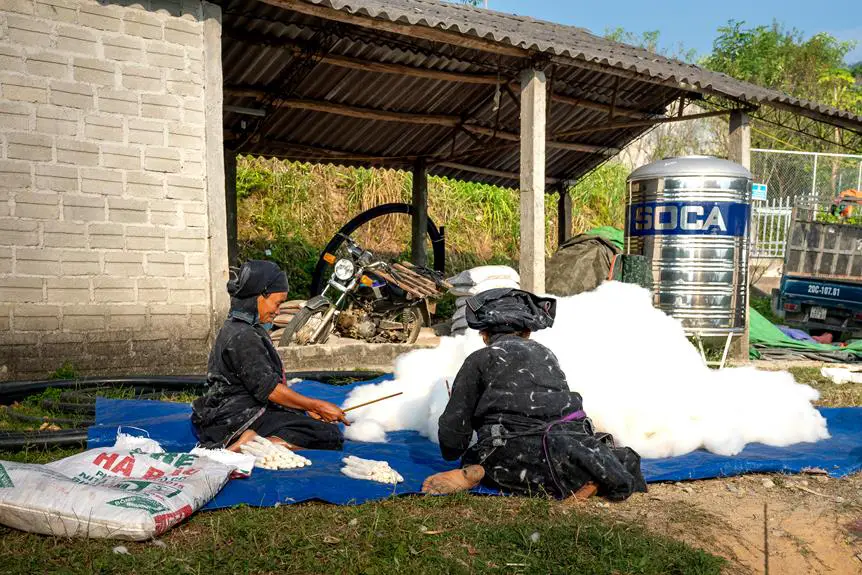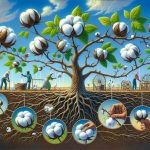When you consider the environmental impact of your clothing choices, Pima cotton stands out for its impressive sustainability attributes. This crop thrives in arid conditions, requiring significantly less water and fewer chemicals compared to other cotton varieties. By promoting healthier ecosystems and enhancing soil health, Pima cotton not only supports biodiversity but also addresses pressing environmental concerns. Its biodegradability and ability to capture carbon dioxide add further layers to its eco-friendly profile. Curious about how these factors play out in practical terms? There's much more to uncover about its role in sustainable agriculture.
Table of Contents
Water Efficiency in Cultivation
Pima cotton thrives in arid conditions, using significantly less water than conventional cotton varieties. This incredible water efficiency makes it an attractive option for farmers operating in regions where water scarcity is a concern. By choosing Pima cotton, you're not just opting for a high-quality fiber; you're also contributing to more sustainable farming practices.
The plant's deep root system allows it to access moisture deeper in the soil, reducing the need for frequent irrigation. When you grow Pima cotton, you'll notice lower water usage without sacrificing yield or quality. This means you can cultivate a profitable crop while helping to conserve precious water resources.
Moreover, adopting Pima cotton can improve soil health, as its cultivation often involves practices that enhance soil structure and moisture retention. With climate change putting additional pressure on water supplies, growing Pima cotton can be a proactive step toward a more sustainable agricultural future.
Reduced Chemical Usage
When you choose Pima cotton, you're opting for a product that often requires fewer pesticides than conventional cotton.
This reduction not only promotes healthier soil but also supports organic cultivation methods that benefit the environment.
Lower Pesticide Requirements
Choosing Pima cotton means embracing a crop that naturally requires fewer pesticides, leading to a healthier environment. This is great news for both you and the planet.
Pima cotton plants have a genetic resilience that allows them to fend off pests more effectively than conventional cotton varieties. As a result, you won't need to rely on harsh chemicals to keep your crops safe.
By opting for Pima cotton, you're contributing to reduced chemical runoff, which can harm local ecosystems and water sources. Fewer pesticides mean cleaner air, soil, and water, benefiting not just agriculture but also the communities surrounding cotton farms.
It's a win-win situation, as you help protect biodiversity while supporting sustainable farming practices.
Moreover, lower pesticide requirements can lead to healthier working conditions for farmers. They're exposed to fewer chemicals, reducing potential health risks associated with pesticide exposure.
Choosing Pima cotton supports a more ethical and eco-friendly approach to agriculture, fostering a safer environment for everyone involved.
Organic Cultivation Methods
Opting for organic cultivation methods dramatically reduces chemical usage, promoting a healthier ecosystem and ensuring the sustainability of cotton farming. By choosing organic practices, you're not just making a choice for your wardrobe; you're contributing to a larger movement towards environmental responsibility.
Consider the impact of your choice:
- Protecting pollinators: Fewer chemicals mean safer habitats for bees and butterflies, crucial for our food supply.
- Preserving biodiversity: Organic farms often support a wider range of plant and animal life, enriching the ecosystem.
- Cleaner water: Reduced runoff from chemical fertilizers and pesticides helps keep our water sources pure and drinkable.
- Safer communities: Organic farming minimizes the exposure of harmful chemicals to farm workers and nearby residents, promoting health.
Choosing Pima cotton grown through organic methods means you're taking a stand for the environment. You're helping to create a world where agriculture and nature coexist harmoniously, ensuring that the beauty and vitality of our planet endure for years to come.
Soil Health Improvement
Organic cultivation methods not only protect ecosystems but also significantly enhance soil health by reducing the reliance on chemical inputs. When you choose Pima cotton, you're supporting practices that prioritize natural fertilizers and pest control. This approach leads to healthier soil, which in turn promotes biodiversity and resilience in the ecosystem.
Here's a quick breakdown of the benefits of reduced chemical usage:
| Benefit | Description | Impact |
|---|---|---|
| Improved Soil Structure | Organic methods enhance soil aeration | Better water retention |
| Increased Microbial Activity | Natural fertilizers boost beneficial microbes | Healthier plant growth |
| Reduced Soil Erosion | Cover crops and organic matter minimize erosion | Sustainable land use |
Soil Health Improvement
When you choose Pima cotton, you're not just getting a high-quality fabric; you're also supporting soil health.
This type of cotton enhances nutrient retention and helps reduce soil erosion, ensuring a thriving ecosystem.
Enhanced Nutrient Retention
Pima cotton's deep root system enhances nutrient retention in the soil, promoting healthier ecosystems and more sustainable farming practices. This unique characteristic not only supports the growth of the cotton itself but also benefits the surrounding environment. When you choose Pima cotton, you're contributing to improved soil health, which can lead to numerous positive impacts.
- You'll witness increased crop yields, benefiting farmers and local economies.
- Healthier soil means more vibrant ecosystems, teeming with life.
- Enhanced nutrient retention helps reduce the need for chemical fertilizers, fostering a cleaner environment.
- By improving soil structure, you're aiding in water absorption, essential for combating drought.
When you invest in Pima cotton, you're not just making a choice for quality; you're choosing to support practices that enhance the very foundation of our food systems. Enhanced nutrient retention is crucial for long-term soil health, creating a win-win for both farmers and the environment.
Embrace the benefits of Pima cotton and be part of the solution for a more sustainable future!
Reduced Soil Erosion
One of the key advantages of Pima cotton is its ability to significantly reduce soil erosion, ensuring that precious topsoil remains intact and fertile. This variety of cotton has deep roots that stabilize the soil, preventing it from being washed or blown away during heavy rains or strong winds. When you choose Pima cotton, you're contributing to healthier ecosystems and more resilient agricultural land.
Additionally, because Pima cotton is often grown with fewer chemical inputs, it encourages a more natural balance in the soil. The reduced use of pesticides and fertilizers means less runoff into nearby waterways, which can further erode soil and degrade water quality.
You'll find that healthier soil leads to better crop yields, making it a win-win for farmers and the environment alike.
Biodegradability of Pima Cotton
Biodegradable by nature, Pima cotton breaks down more easily in the environment compared to synthetic fibers, reducing its ecological footprint.
When you choose Pima cotton, you're not just selecting a high-quality fabric; you're also making a responsible choice for the planet. Unlike synthetic materials that can linger for decades, Pima cotton decomposes naturally, returning nutrients to the soil and promoting healthier ecosystems.
Here are some emotional benefits of choosing biodegradable Pima cotton:
- Feel good knowing you're making a positive impact on the environment.
- Support sustainable practices that protect wildlife and natural habitats.
- Encourage a healthier planet for future generations to enjoy.
- Reduce landfill waste, contributing to a cleaner, greener Earth.
Carbon Sequestration Benefits
Choosing Pima cotton not only helps reduce waste but also plays a significant role in carbon sequestration, capturing and storing carbon dioxide from the atmosphere.
When you opt for Pima cotton, you support a crop that thrives in conditions that promote healthy soil and robust plant growth. This growth is essential because plants absorb CO2 during photosynthesis, effectively pulling carbon from the air and storing it in their fibers and the soil.
Because Pima cotton is often grown in sustainable farming systems, its cultivation enhances soil health. Healthier soils can store more carbon, which means that every Pima cotton product you choose contributes to reducing greenhouse gases. This process not only mitigates climate change but also improves the resilience of ecosystems.
Additionally, Pima cotton's longer lifespan and durability mean that products made from it can replace less sustainable options, further minimizing carbon outputs associated with production and disposal.
Sustainable Farming Practices
Sustainable farming practices in Pima cotton cultivation not only conserve water and reduce chemical inputs but also enhance biodiversity and soil health. By choosing Pima cotton, you're supporting methods that prioritize the environment and promote healthier ecosystems.
Here are some key benefits of sustainable practices in Pima cotton farming:
- Water Conservation: Farmers use advanced irrigation techniques to minimize water waste, ensuring that every drop counts.
- Reduced Chemical Use: By implementing organic pest control and natural fertilizers, you help protect the surrounding wildlife and water sources.
- Biodiversity Enhancement: Sustainable farms often incorporate cover crops and crop rotation, fostering a diverse range of flora and fauna.
- Soil Health Improvement: Practices like no-till farming enrich the soil, promoting better nutrient retention and carbon sequestration.
When you choose Pima cotton, you invest in a future where farming practices work in harmony with nature. Your decision can make a significant impact, fostering a healthier planet for generations to come.
Frequently Asked Questions
What Are the Origins of Pima Cotton?
Pima cotton originates from Peru, where it was first cultivated by the ancient civilizations. It gained popularity in the United States during the early 1900s, thanks to its superior quality and unique, silky fibers.
How Does Pima Cotton Compare to Regular Cotton?
When you compare Pima cotton to regular cotton, you'll notice Pima's fibers are longer and stronger, resulting in softer fabric that resists fraying, fading, and wrinkles better than typical cotton. You'll appreciate its luxurious feel.
Is Pima Cotton Safe for Sensitive Skin?
Yes, Pima cotton's soft, breathable fibers make it great for sensitive skin. It's less likely to irritate, so you can enjoy comfort without worrying about rashes or allergic reactions. It's a safe choice for you.
Where Can I Purchase Eco-Friendly Pima Cotton Products?
You can purchase eco-friendly Pima cotton products at specialty online retailers, sustainable fashion brands, or local organic stores. Always check for certifications to ensure you're getting genuine eco-friendly options that align with your values.
Are There Certifications for Sustainable Pima Cotton?
Yes, there are certifications for sustainable Pima cotton. Look for labels like GOTS (Global Organic Textile Standard) or OEKO-TEX, which ensure the cotton meets environmental and ethical standards. These certifications guarantee you're making a responsible choice.
- Is Polyamide A Good Material - July 1, 2025
- Is Nylon 66 A Polyamide - July 1, 2025
- Is 100 Polyamide Waterproof - July 1, 2025





